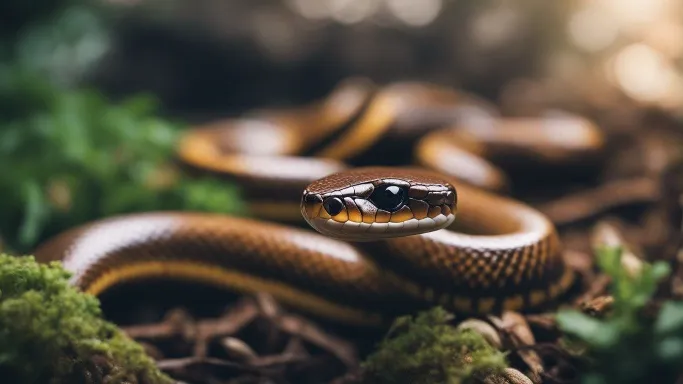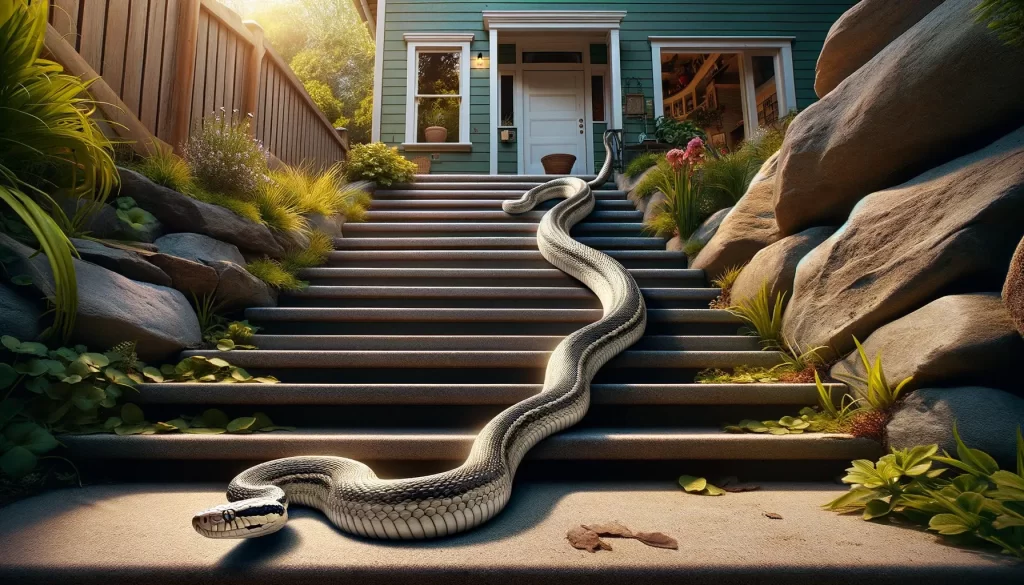So, you’ve been looking into getting a pet snake and came across a fascinating species called the sharp-tailed snake.
But before you start dreaming of owning this beautiful creature, you might be wondering, can you actually keep a sharp-tailed snake as a pet?
Yes, it is possible to keep a sharp-tailed snake as a pet, but it requires specific care and environment to thrive. These snakes need a regulated temperature to survive, and they prefer moist environments. It is essential to provide them with a suitable enclosure and diet to ensure their health and well-being. It is crucial to research and understand the responsibilities of owning a sharp-tailed snake before deciding to keep one as a pet.
Well, let’s explore this question together and dive into the world of sharp-tailed snakes to find out if they’re suitable for the life of a beloved pet.
Can You Keep A Sharp Tailed Snake As A Pet?

Overview and Introduction
When thinking about adding a new pet to your family, reptiles can be an intriguing choice.
One reptile that often catches the eye of enthusiasts is the sharp-tailed snake. With its unique appearance and interesting behaviors, these snakes can be captivating pets.
However, before you decide to bring one home, it’s important to consider several factors.
In this article, we will explore legal considerations, habitat requirements, feeding and diet, handling and temperament, health and care, interactions with other pets, as well as cost and availability.
What is a Sharp Tailed Snake?
Sharp-tailed snakes, also known as Contia tenuis, are small and slender reptiles that are native to western North America.
They are typically around 8 to 12 inches in length and have distinctive sharp scales at the tip of their tail, which gives them their name.
These snakes are known for their secretive nature and often hide in leaf litter or burrows.
Popularity as Pets
While not as common in the pet trade as some other snake species, sharp-tailed snakes have gained popularity among reptile enthusiasts.
Due to their relatively small size and interesting appearance, they attract those looking for a unique and manageable pet snake.
However, it’s essential to research and understand their specific needs before considering them as pets.
Legal Considerations
Before acquiring any pet, it’s crucial to familiarize yourself with the legal considerations surrounding its ownership.
Sharp-tailed snakes are protected by various state and federal laws, depending on your location.
These laws are in place to protect the wild populations and prevent illegal trafficking. It is absolutely necessary to check the laws and regulations of your region before considering a sharp-tailed snake as a pet.
License and Permits
In some areas, obtaining a license or permit may be necessary to legally own a sharp-tailed snake.
These permits typically involve providing proof of experience and knowledge in reptile care.
It is important to contact your local wildlife or fish and game department to inquire about the specific requirements for owning a sharp-tailed snake as a pet.
Habitat Requirements
Creating the ideal habitat for your sharp-tailed snake is crucial to its overall health and well-being.
Let’s explore the various factors to consider when setting up and maintaining its enclosure.

Enclosure Size and Type
A suitable enclosure for a sharp-tailed snake should be at least 20 gallons in size, although larger is always better.
Glass or plastic enclosures with a secure mesh lid work well to provide the necessary ventilation.
It’s important to ensure that the enclosure has a secure latch system to prevent any escapes.
Substrate and Decorations
Sharp-tailed snakes require a substrate that mimics their natural environment. Cypress mulch, coco coir, or sphagnum moss can be used as a bedding material.
These materials help maintain humidity and allow the snake to burrow. Adding some hiding spots, such as rocks or pieces of bark, will provide a sense of security for the snake.
Temperature and Humidity
Maintaining the correct temperature and humidity levels is crucial for the well-being of your sharp-tailed snake.
The temperature gradient in the enclosure should range from 75°F (24°C) on the cool side to 85°F (29°C) on the warm side.
Using an under-tank heating pad or a radiant heat panel can help achieve these temperatures.
Additionally, a relative humidity level of 50-60% should be maintained by misting the enclosure daily.
Lighting
Sharp-tailed snakes, like other reptiles, benefit from exposure to natural light. Providing a full-spectrum UVB light for 10-12 hours a day will help mimic their natural environment.
This light is essential for maintaining proper calcium metabolism and overall health.
Water Source
A shallow water dish should be provided in the enclosure to ensure your sharp-tailed snake has access to fresh water at all times.
It’s important to choose a dish that is large enough for the snake to soak in if it desires. The water should be changed regularly to maintain cleanliness.
Feeding and Diet
Proper nutrition is essential for the health and growth of your sharp-tailed snake. Let’s delve into their feeding requirements and dietary needs.
For a more in-depth look into what sharp-tailed snakes eat, take a look at this article I wrote.
Prey Types
Sharp-tailed snakes are typically insectivores, feeding on small invertebrates like slugs, snails, and earthworms in the wild.
In captivity, they can be fed a variety of appropriately sized live or thawed frozen insects, such as crickets, mealworms, or waxworms.
It’s important to gut-load the prey insects with nutritious food before offering them to the snake.
Feeding Schedule and Quantity
Young sharp-tailed snakes should be fed every 3-4 days, while adults can be fed every 10-14 days.
It’s essential to monitor their weight and adjust the feeding schedule accordingly. The prey item should be roughly the same diameter as the snake’s widest body section to ensure proper digestion.
Nutritional Supplements
To ensure your sharp-tailed snake receives all the necessary nutrients, it may be beneficial to dust their prey with a reptile-specific calcium supplement.
This helps prevent calcium deficiencies and subsequent health issues.
Handling and Temperament
Understanding the temperament of sharp-tailed snakes is vital before attempting to handle them. Let’s explore their temperament and some handling techniques.
Temperament of Sharp Tailed Snakes
Sharp-tailed snakes are generally docile and non-aggressive. However, like any animal, they may become defensive if they feel threatened.
It’s essential to handle them with care and respect. Providing a sense of security, such as wearing gloves, during handling sessions may help reduce stress for both you and the snake.
Handling Techniques and Tips
When handling a sharp-tailed snake, it’s important to support its body and avoid excessive squeezing or pressure.
Avoid sudden movements or loud noises that may startle the snake. It’s crucial to wash your hands before and after handling to prevent the spread of bacteria or diseases.
Health and Care
Keeping your sharp-tailed snake healthy and thriving requires proper care and attention. Let’s discuss common health issues and how to provide the necessary care.
Common Health Issues
When properly cared for, sharp-tailed snakes are generally hardy and have few health issues.
However, some common ailments in reptiles include respiratory infections, parasites, and skin issues.
Regularly monitoring your snake’s behavior, appetite, and appearance can help detect any health issues early on.
Preventive Measures
Maintaining proper hygiene in the enclosure and providing a clean and stress-free environment are essential preventive measures.
Regularly cleaning the enclosure, including removing any waste, and ensuring proper humidity levels can help minimize the risk of health issues.
Veterinary Care
Just like any pet, sharp-tailed snakes may require veterinary care throughout their lives. Finding a qualified reptile veterinarian experienced in treating snakes is important.
Regular check-ups, even when the snake appears healthy, can help detect any underlying issues and ensure the overall well-being of your pet.
To schedule an appointment with a vet online 24/7, click here.

Interactions with Other Pets
If you have other pets in your household, it’s important to consider how they will interact with a sharp-tailed snake. Let’s explore compatibility and safety precautions.
Compatibility with Other Animals
Due to their small size and secretive nature, sharp-tailed snakes are often kept in their own enclosure without direct interactions with other pets.
However, it’s important to note that some larger reptiles or predatory pets, such as cats or dogs, may view the snake as prey.
It’s crucial to supervise any interactions and ensure the safety of all animals involved.
Precautions and Supervision
If you have other pets, it’s essential to provide a secure and separate area for your sharp-tailed snake’s enclosure.
This ensures the safety of the snake and prevents any potential accidents. Always supervise interactions between pets to minimize the risk of injury.
Cost and Availability
Considering the cost and availability of a sharp-tailed snake is essential before making the decision to bring one home.
Cost of Acquisition
Sharp-tailed snakes are not as readily available as some other snake species due to legal considerations and limited supply.
The cost of acquiring a sharp-tailed snake can vary depending on the rarity of the morph or coloration, as well as the breeder or seller. It’s essential to budget for the initial purchase cost.
Ongoing Expenses
In addition to the initial cost of acquiring a sharp-tailed snake, there are ongoing expenses to consider.
These may include the cost of food, enclosure maintenance, veterinary care, and potential additional equipment, such as heating or lighting fixtures.
It’s important to budget for these expenses to ensure the proper care of your pet.
Finding a Reputable Breeder or Seller
When considering acquiring a sharp-tailed snake, it’s crucial to find a reputable breeder or seller.
Reputable breeders will provide healthy and well-cared-for snakes and will offer support and guidance throughout the ownership journey.
Researching and getting recommendations from other reptile enthusiasts or local herpetological societies can help you find a reliable source.
Final Thoughts
Keeping a sharp-tailed snake as a pet can be a rewarding experience for reptile enthusiasts.
Understanding the legal considerations, habitat requirements, feeding and diet, handling and temperament, health and care, interactions with other pets, as well as the cost and availability is crucial for providing optimal care for your snake.
With proper research, preparation, and commitment, you can offer a suitable and enriching environment for a sharp-tailed snake and enjoy the companionship of this unique reptile species.




